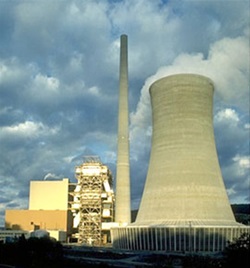Radiation emergency preparedness

Radiation is a part of life. Background radiation from natural minerals is around us all the time. Fortunately, there are very few situations where an average person is exposed to uncontrolled sources of radiation. Nevertheless, it is wise to be prepared and know what to do if such a situation arises.
Hazardous radiation can result from an accident at a nuclear, research, or medical facility that uses radioactive materials in their processes, or from a nuclear detonation. Radioactive materials may also be used to perpetuate a terrorist act, and are classified as "Weapons of Mass Destruction" (WMD) when used with malicious intent.
Learn more from the Environmental Protection Agency on the impacts of radiation on our lives.
More on radioactive materials
Radioactive materials are very similar to chemical materials. They usually do not kill humans outright. Exposure to a lethal dose would require very large amounts of radioactive material at fairly close range. While the time required for a material to decay and render itself inert varies widely, many materials can persist in the environment from years to centuries at levels that can impact humans and the environment.
Radioactive materials may also be used as "Weapons of Mass Destruction" (WMD) when adopted with malicious intent. WMDs can belong to one or more of the following groups: chemical, biological, radiological, nuclear, or explosive.
The usefulness of radioactive materials to terrorists is derived from a long-term civilian exposure to moderate amounts of radiation and the difficulty of cleaning the impacted area. Radioactive materials are similar to chemical and biological agents in that they cannot be obviously observed by the public. As a result, a radiation-related terrorist attack can deliver a significant psychological impact to the community.
Prepare for radiation emergencies
- Be prepared to evacuate with your emergency supplies kit or shelter-in-place in your home.
- Make a list of existing or potential shelters near your home, workplace, and school (basements or windowless areas in high-rise buildings, bus/light rail tunnels).
- Be observant and report suspicious activities to law enforcement.
- Be prepared for any type of terrorism event.
During a radiation emergency
- If inside, stay inside. If directed to do so, shelter-in-place unless instructed by authorities to leave. Close windows and doors, turn off air conditioners, heaters and other ventilation systems. Stay near the center of the building, preferably an interior room. If there is a basement, go there. Once the initial blast is over, radioactive materials can be spread in smoke and debris in the air. By staying inside you reduce any potential exposure to airborne radioactive material.
- If you are warned of a radiation release inside, cover your nose and mouth and go outside immediately. Look for a building or other shelter that has not been damaged and quickly get inside.
- If you are outside, seek immediate shelter indoors in the nearest undamaged building. If an appropriate shelter is not available, move as rapidly as is safe upwind and away from the location of the explosive blast. Then seek appropriate shelter as soon as possible.
- Remember - to limit the amount of radiation you are exposed to, think about shielding, distance, and time.
- Shielding: If you have a thick shield between yourself and the radioactive materials, more of the radiation will be absorbed by the shielding material, and you will be exposed to less radiation.
- Distance: The further away you are away from the blast and the fallout, the lower your exposure.
- Time: Minimizing time spent exposed to radiation will also reduce your risk.
- Listen to your weather radio or local media for current information.
- Follow instructions - the best way to avoid exposure to radiation is to do what experts advise. If told to evacuate, do so promptly. Listen for information about the location of the radioactive cloud. Even if it has already passed, radioactive contamination may have fallen on the ground and experts will recommend the best ways to safely leave the area.
- If you think you have been exposed to radiation, carefully take off the outer layer of your clothing and put it in a plastic bag; then take a warm shower to rinse off any radioactive materials. Place the sealed bag in a room away from people.

 Translate
Translate